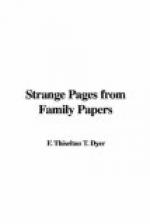“Since that hour,” writes Howitt, “every object, about the place which could suggest to the memory this fatal event, has been changed or removed. The summer-house has been razed to the ground; the disposition of the garden itself altered; but,” he adds, “such tragic passages in human life become part and parcel of the scene where they occur—they become the topic of the winter fireside. They last while passions and affections, youth and beauty last. They fix themselves into the soil, and the very rock on which it lies, and though the house was razed from the spot, and its park and pleasaunces turned into ploughed fields, it would still be said for ages: Here stood Shuckburgh Hall, and here fell the young and lovely Miss Shuckburgh by the hand of her despairing lover.”
And to conclude with a romance in brief, some forty or fifty years ago, in the far north of England a girl was on the eve of being married. Her wedding dress was ordered, the guests were bidden. But, it is said that at the eleventh hour, in a fit of passion and paltry jealousy, she resented some fancied want of devotion in her lover.
He was single-minded, loyal, and altogether of finer stuff than herself; but she was a wretched slave to such old stock phrases as delicacy, family pride, and the like, and so he was allowed to go, for she came of people who looked upon unforgiveness as a virtue.
Accordingly the discarded lover exchanged into a regiment under orders for Afghanistan. At the time, our troops were engaged there in hot fighting. The lad fell, and hidden on his breast was found a locket which his sweetheart had once given him. It came back to her through a brother officer, who had known something of his sad story, with a stain on it—a stain of his blood. When that painful relic silently told her of the devotion which she had so unjustly and basely wronged, there came, in the familiar lines:
A mist and a weeping rain,
And life was never the same
again.
That stain marked every day of a lonely life throughout forty years or more.




